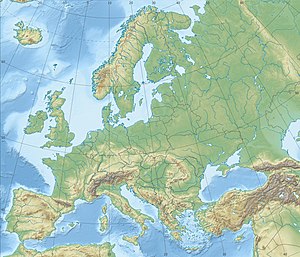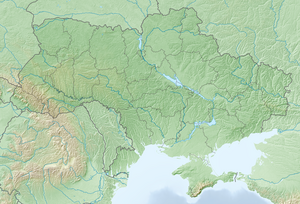Siege of Ochakov (1771)
| Siege of Ochakov (1771) | |||||||
|---|---|---|---|---|---|---|---|
| Part of the Russo-Turkish War (1768–1774) | |||||||
 Map of the town and fortress of Özi, c. 1737 | |||||||
| |||||||
| Belligerents | |||||||
|
|
| ||||||
| Commanders and leaders | |||||||
|
| Unknown | ||||||
| Strength | |||||||
| 1,000–2,000 | 3,000–4,000 | ||||||
| Casualties and losses | |||||||
| Low | 500–1,000 killed and injured | ||||||
Location within Europe | |||||||
The siege of Ochakov or the siege of Özi[a] was a military siege undertaken by Russia between July and 2 August 1771 against the city of Özi, which was under Ottoman rule. The siege was part of the Russo-Turkish War (1768–1774), and resulted in an Ottoman victory.[1]
Siege
[edit]After occupying much of the Crimean Khanate during the Russo-Turkish War (1768–1774), the Russians marched onto the Ottoman fortresses of Özi and Kılburun (Kinburn). A force under an unknown commander laid siege on Özi in late July. The defending Ottoman army was headed by Hazinedar Şahin Ali Pasha. The pasha employed a strategy of drawing the besieging forces close to the fortress walls by feigning retreat. With the Russians haven fallen for this, the defenders launched an intense barrage of artillery onto the invaders. The Ottoman garrison inflicted substantial losses on the Russian forces following this attack. Thus, the Russians were compelled to lift the siege on 2 August 1771, only a few days after having besieged the fortress. Abdullah Pasha, the defender of Kılburun, similarly repelled the advances of the Russians (led by Vasily Dolgorukov) on 31 August 1771.[2][3]
Aftermath
[edit]Grand Vizier Silahdar Cihangirli Mehmed Pasha, who was in Varna at the time, awarded 10,000 ducats to Hazinedar Şahin Ali Pasha for his role in defending Özi, and gave 350 bags of aspers for the reinforcement of the fortress. He also awarded Abdullah Pasha with 3,000 ducats for standing his ground at Kılburun.[2]
Notes
[edit]Citations
[edit]- ^ a b Imber, Colin (2002). The Ottoman Empire, 1300-1650: The Structure of Power. New York City: Palgrave Macmillan. p. 55. ISBN 9780333613863.
- ^ a b von Hammer-Purgstall, Joseph. Çevik, Mümin (ed.). Büyük Osmanlı Tarihi [Great Ottoman History] (in Turkish). Vol. 16. Translated by Özdek, Refik. Istanbul: Üçdal Neşriyat. pp. 188–189.
- ^ Creasy, Edward S. (1856). The Ottoman Turks: From the Beginning of their Empire to the Present Time. Vol. 2. London: Richard Bentley. p. 235.


